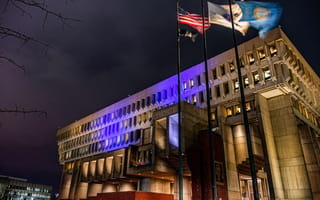
Boston City Council has voted unanimously to ban its government from using facial recognition technology, including the police department, making it the largest city on the East Coast to do so.
The law makes it illegal for city officials to “obtain, retain, possess, access, or use” facial recognition technology against the people of Boston. It has also banned the government from entering into contracts with third parties to obtain face surveillance. However, Boston police and other officials are still allowed to follow up on tips from other law enforcement agencies who have used facial recognition software.
Five other cities in Massachusetts, including Springfield, Cambridge, Northampton, Brookline, and Somerville, have also banned their local governments from using facial recognition technology.
BriefCam is mentioned in the ordinance as one of the face surveillance companies the Boston Police Department has used in the past, and the company claims to have worked with the BPD to investigate the Boston Marathon Bombing. A BuzzFeed News investigation also found that entities in and around Boston, including local police departments, have turned to another facial recognition company called Clearview AI.
Boston’s ordinance acknowledges facial recognition technology’s “discriminatory tendencies,” noting that it tends to be inaccurate when used on “African American and [Asian American and Pacific Islander] faces,” which “has the potential to harm communities of color who are already facing increased levels of surveillance and harassment.”
The ordinance, along with the others throughout the state, was put in place with the help of the American Civil Liberties Union of Massachusetts, which has been advocating against facial recognition software with its Press Pause Face Surveillance campaign. The organization’s executive director Carol Rose said in a statement that this is an important step to “effectively address police abuses and systemic racism.”
“Face surveillance supercharges the policing of Black and brown communities and tramples on everyone’s rights to anonymity and privacy,” Rose continued. “Together, these local bans strengthen the civil liberties of more than one million Massachusetts residents, protecting them from intrusive, flawed technologies.”
Boston and these surrounding municipalities aren’t the only cities taking action in response to criticisms of facial recognition software. San Francisco and Oakland have passed similar bans. Plus, last week New York City Council passed the POST Act, requiring its police department to disclose their use of surveillance technology. The legislation also mandates that the New York Police Department establish policies on how to use the technology and oversight over its use to ensure compliance.
The private sector is also following suit. Amazon has decided to halt police use of its facial recognition software for one year and IBM is abandoning the business altogether. Microsoft says it has never sold its technology to law enforcement, but Microsoft’s Brad Smith has promised the company won’t until there is a federal law put in place to regulate its use.
Boston’s ordinance was sponsored by councilors Michelle Wu and Ricardo Arroyo and got support from groups like the Boston Teachers Union, the Muslim Justice League and the Student Immigrant Movement.
“This ordinance codifies our values that community trust is the foundation for public safety and public health,” Wu said in a statement. “I’m proud of the Boston City Council for leading the way alongside community advocates to pass policies ensuring transparent, accountable, community oversight of surveillance.”




